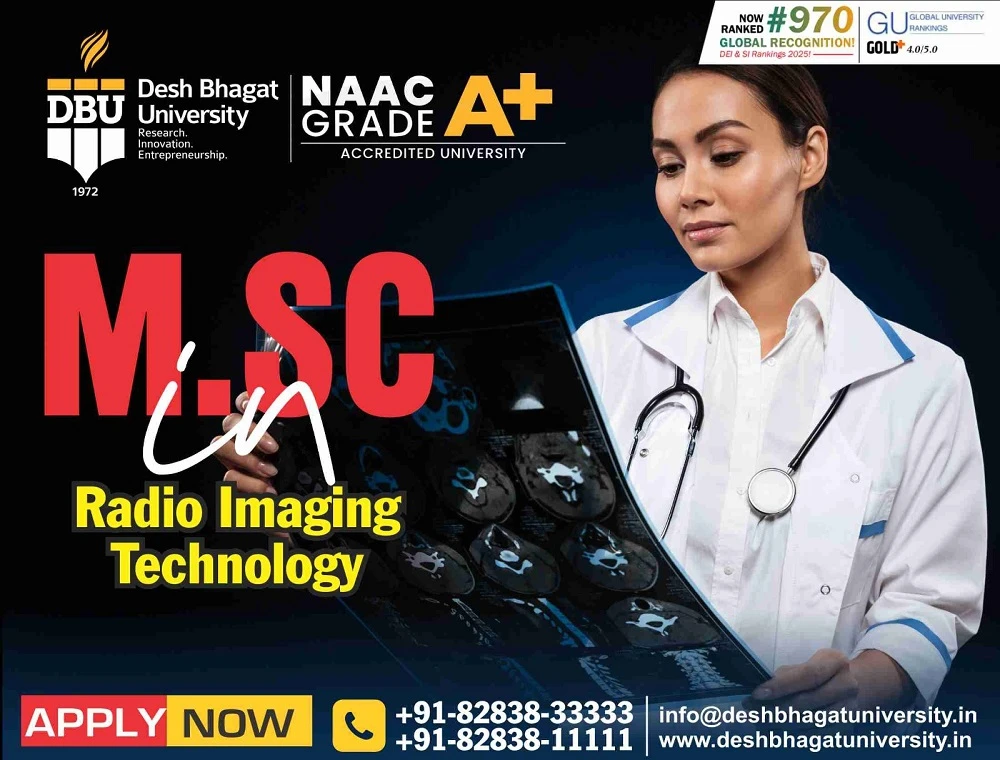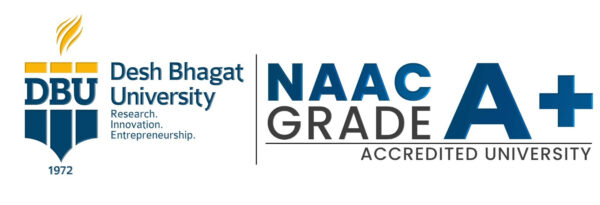MSc in Radiology and Imaging Technology: Duration, Salary
September 30, 2025 2025-09-30 9:55MSc in Radiology and Imaging Technology: Duration, Salary

MSc in Radiology and Imaging Technology: Duration, Salary
Desh Bhagat University (DBU), located in Mandi Gobindgarh, Punjab, is known for its quality education in healthcare and allied health sciences. One of its most popular programs is the MSc in Radiology and Imaging Technology, which trains students to become skilled professionals in medical imaging. This program is perfect for students who want to build a career in hospitals, diagnostic centers, and research institutes.
The MSc Radiology program equips students with practical and theoretical knowledge in imaging techniques like X-rays, CT scans, MRI, and ultrasound. It helps students learn how to operate modern imaging equipment, interpret medical images, and assist doctors in patient diagnosis and treatment planning.
What is MSc in Radiology and Imaging Technology?
The MSc in Radiology and Imaging Technology is a postgraduate course designed for students who have completed their bachelor’s degree in radiology or a related field. The course focuses on advanced imaging techniques, patient care, and medical technology.
Students learn about:
- X-ray imaging
- Computed Tomography (CT)
- Magnetic Resonance Imaging (MRI)
- Ultrasound and Doppler techniques
- Radiation safety and protection
- Medical imaging ethics
By the end of this course, students will have the knowledge and skills required to work in a medical imaging department and help doctors diagnose and treat patients accurately.
Eligibility Criteria
To apply for the MSc in Radiology and Imaging Technology at DBU, candidates must fulfill the following requirements:
- Educational Qualification: A Bachelor’s degree in Radiology and Imaging Technology or an equivalent recognized course.
- Minimum Marks: Students should have at least 50% marks in their qualifying exam.
- Entrance Exam: Admission is based on the university’s entrance examination.
- Recognition: The qualifying degree must be from a recognized university.
These criteria ensure that students joining the program have the necessary foundation in radiology and imaging technology.
MSc Radiology Course Duration
The MSc radiology course duration at Desh Bhagat University is two years, divided into four semesters. The duration is carefully designed to provide students with enough time to learn both theoretical and practical aspects of radiology.
During the first year, students focus on basic imaging techniques, human anatomy, and radiology principles. In the second year, students get advanced training in specialized imaging methods, patient care, and clinical exposure. The program also includes laboratory work and internships in hospitals and diagnostic centers.
Course Structure and Syllabus
The MSc in Radiology and Imaging Technology at DBU has a well-structured syllabus that covers all major aspects of medical imaging. Some of the topics included are:
- Basic Radiography: Principles of X-rays, image production, and safety measures.
- Computed Tomography (CT): Techniques, image acquisition, and clinical applications.
- Magnetic Resonance Imaging (MRI): MRI physics, protocols, and interpretation of images.
- Ultrasound Imaging: Types of ultrasound, Doppler studies, and practical applications.
- Radiation Safety: Guidelines for patient and staff safety during imaging.
- Medical Ethics: Professional ethics, patient care, and confidentiality.
Practical sessions allow students to operate imaging machines, interpret scans, and assist in patient diagnostics. Practical experience is an essential part of the program.
Skills Acquired in MSc Radiology
Students completing this program gain the following skills:
- Technical Skills: Operating modern imaging machines like CT, MRI, and ultrasound devices.
- Diagnostic Skills: Understanding medical images to assist doctors in diagnosis.
- Patient Care: Communicating with patients and ensuring their safety during imaging procedures.
- Research Skills: Conducting studies and contributing to advancements in medical imaging.
- Ethical Awareness: Following ethical guidelines in medical imaging and patient care.
These skills prepare students to work in hospitals, clinics, research labs, and educational institutions.
MSc Radiology Salary in India
The MSc radiology salary in India varies depending on experience, location, and role.
- Entry-Level Professionals: ₹3 to ₹5 lakhs per year
- Mid-Level Professionals: ₹5 to ₹8 lakhs per year
- Senior-Level Professionals: ₹8 lakhs and above per year
Salaries can be higher in metro cities or private hospitals. Professionals with specialized skills or advanced certifications in MRI, CT, or ultrasound may earn even more.
Career Opportunities
After completing the MSc in Radiology and Imaging Technology, students have many career options:
- Radiologist: Interpreting medical images and assisting doctors in diagnosis.
- Radiology Technologist: Operating imaging machines and managing technical aspects of medical imaging.
- Medical Imaging Specialist: Handling advanced imaging techniques and technologies.
- Researcher: Conducting research in medical imaging and radiology technology.
- Teaching: Becoming faculty in colleges offering radiology courses.
- Hospital Administration: Managing imaging departments in hospitals and clinics.
This program opens doors for students in hospitals, diagnostic centers, research labs, and teaching institutions.
Why Choose Desh Bhagat University for MSc Radiology?
Desh Bhagat University offers many advantages for MSc Radiology students:
- Experienced Faculty: Teachers with deep experience in radiology and imaging technology.
- Modern Facilities: Labs with the latest imaging machines and practical training equipment.
- Clinical Exposure: Internships and practical experience in hospitals and diagnostic centres.
- Comprehensive Curriculum: Balanced mix of theory, practice, and research.
- Placement Support: Career guidance and placement assistance for students.
Choosing DBU gives students a good education, hands-on training, and real experience in medical imaging.
Admission Process
The admission process for MSc Radiology at DBU is simple:
- Application: Fill out the application form available on the website.
- Entrance Exam: Appear for the university entrance exam to assess knowledge and aptitude.
- Interview: Shortlisted candidates may attend an interview for final selection.
- Enrollment: Complete document submission and fee payment to secure admission.
DBU ensures transparency and fairness throughout the admission process.
Future Scope of MSc Radiology
The healthcare sector in India is growing fast. With the increase in hospitals, diagnostic centres, and research labs, the demand for skilled radiology professionals is rising.
Students completing MSc in Radiology can:
- Work in top hospitals and private diagnostic centres.
- Become specialists in CT, MRI, and ultrasound imaging.
- Take part in medical research projects and innovations.
- Teach future radiology students in colleges and universities.
This program offers both stability and growth opportunities for aspiring professionals.

Advantages of MSc in Radiology and Imaging Technology
- High Demand: Skilled radiology professionals are in demand in hospitals and diagnostic centres.
- Practical Learning: Students get practical experience with modern imaging machines.
- Career Growth: Opportunities for promotions and specialized roles in radiology departments.
- Competitive Salary: Skilled professionals can earn good salaries in India and other countries.
- Contribution to Healthcare: Radiology professionals play a critical role in patient diagnosis and treatment.
Conclusion
The MSc in Radiology and Imaging Technology at Desh Bhagat University is a comprehensive program for students who want to build a career in medical imaging. With a two-year duration, practical training, and modern facilities, students gain the skills needed to succeed in hospitals, clinics, research labs, and teaching roles.
The program ensures practical exposure, ethical training, and advanced knowledge of imaging technology. Students completing this course can expect good salary packages, career growth, and opportunities to contribute meaningfully to healthcare in India.
FAQs
1. What is MSc in Radiology and Imaging Technology?
The MSc in Radiology and Imaging Technology is a postgraduate program that teaches students about medical imaging. It focuses on advanced techniques like X-rays, CT scans, MRI, and ultrasound. Students learn to operate machines, interpret images, and assist doctors in diagnosing and treating patients. The course combines theory with practical training.
2. What is the duration of MSc Radiology course?
The MSc radiology course duration at Desh Bhagat University is two years, divided into four semesters. The program includes both theoretical classes and practical training. Students study imaging techniques, human anatomy, patient care, and radiation safety. This duration is sufficient for gaining advanced knowledge and real-world experience in radiology.
3. What are the eligibility criteria for MSc Radiology?
To join the MSc in Radiology at DBU, candidates must have a BSc in Radiology and Imaging Technology or an equivalent degree. They should have at least 50% marks in their qualifying exams. Admission is based on the university’s entrance exam. Students must have completed their degree from a recognized university to apply.
4. What topics are taught in MSc Radiology?
The program covers basic and advanced imaging techniques. Students study X-ray imaging, CT scans, MRI, ultrasound, and Doppler studies. They also learn radiation safety, patient care, and medical ethics. The curriculum includes both theory and practical sessions in labs and hospitals, helping students gain hands-on experience and develop professional skills.
5. What skills will I gain after MSc Radiology?
After finishing the program, students learn how to use imaging machines, read and understand medical images, and take care of patients safely and kindly. They also gain research skills, learn about ethics, and improve problem-solving abilities. These skills help graduates work well in hospitals, clinics, and research centres.
6. What career opportunities are available after MSc Radiology?
Graduates can work as radiologists, radiology technologists, medical imaging specialists, researchers, or teachers. They can join hospitals, diagnostic centres, research labs, and universities. Some may choose administrative roles in medical imaging departments. This program provides a wide range of options in both clinical and academic fields of healthcare.
7. What is the MSc Radiology salary in India?
The MSc radiology salary in India depends on experience, location, and job role. Entry-level professionals may earn around ₹3 to ₹5 lakhs per year. Mid-level professionals earn ₹5 to ₹8 lakhs, while senior professionals or specialists can earn ₹8 lakhs and above. Salary may be higher in metropolitan cities and private hospitals.
8. Why should I choose Desh Bhagat University for MSc Radiology?
Desh Bhagat University provides experienced faculty, modern labs, and clinical exposure in hospitals. The curriculum covers theory and practical training, including internships. The university also offers career guidance and placement support. Choosing DBU ensures students gain quality education, practical experience, and opportunities for growth in the field of radiology.
9. How is the admission process for MSc Radiology?
The admission process at DBU includes filling out the application form online, appearing for the university entrance exam, and attending an interview if shortlisted. Selected candidates must submit the required documents and pay the fees to confirm enrolment. The process is transparent and ensures only eligible and qualified candidates are admitted.
10. Can MSc Radiology graduates work abroad?
Yes, graduates with an MSc in Radiology and Imaging Technology can work abroad, especially in countries with a high demand for medical imaging professionals. International opportunities may require additional certification or licensing, depending on the country. The program equips students with skills and practical knowledge recognized globally in the healthcare industry.







